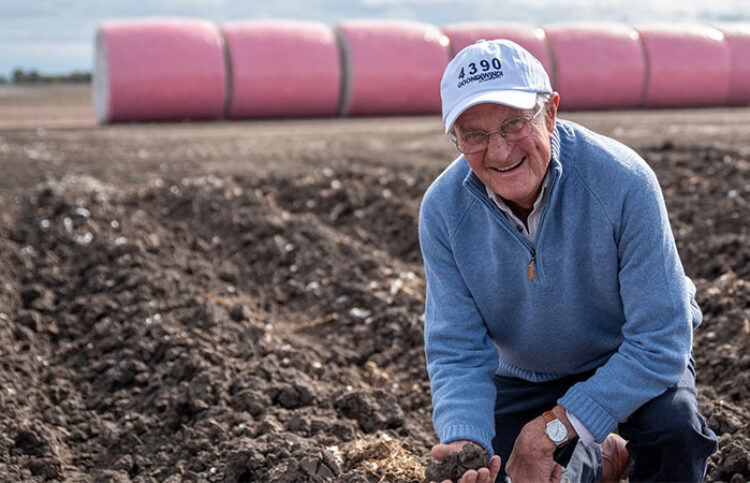
A cotton farm just outside the rural town of Goondiwindi Queensland is the site of a ground breaking trial to test whether shredded cotton products could offer benefits to cotton soil health, and a scalable solution to textile waste.
The project, under the guidance of circular economy specialists Coreo, is a partnership between the Queensland Government, Goondiwindi Cotton, Sheridan, Cotton Australia, Worn Up and Cotton Research and Development Corporation supported soil scientist Dr Oliver Knox of UNE.
Around two tonnes of cotton textiles, garments and end of life State Emergency Service coveralls have been processed at Worn Up in Sydney, transported to “Alcheringa” farm, and spread onto a cotton field by local farmer, Sam Coulton.
The field is being prepared for planting the next cotton crop in October. It’s hoped the fabrics will break down in the soil, increase microbial activity, lock in carbon and provide cover to improve soil moisture.
“In this day and age, we should be part of the solution for taking cotton right back through the system. We grow it here and we should be able to bury it here with positive environmental and economic impact on the local community,” local farmer and Goondiwindi Cotton owner, Sam Coulton said.
Projections show 2,250kg of Carbon Dioxide equivalents (CO2 e) into the atmosphere will be mitigated through the breakdown of these garments in soil rather than landfill.
The trial will look at the breakdown process at different application rates, and will assess effects on soil nutrition, respiration/CO2 and microbial biomass.
The project team hopes the results will provide evidence for a large scale circular solution for 100% cotton textile products in Australia, which are naturally biodegradable, renewable and recyclable.
Following the initial trial, the project team said further testing is likely required on the impact of dyes and finishes on soils and other challenges like the removal of components that don’t break down such as buttons, zips and synthetic threads and tags.
The trial will be completed by cotton harvest in early 2022, with initial results expected shortly after, although it’s expected the real benefits for cotton yield and long-term soil health may not be known for many years.
Back in 2020, Phase One of the project, which was part of the Transition to Action project, involved lab-based testing cotton fabrics to assess what might happen during the biodegradation process, in terms of potential benefits such as carbon and water retention in soils.
The experiment involved burying two centimetre squares of cotton fabric in about 40 grams of moist Goondiwindi soil and incubating it at 20oC for 24 weeks. The buried material equated to between 400-3000 kg of material applied to a hectare of farmland, the equivalent of removing 2,500 to 20,000 t-shirts from landfill (based on average T-shirt weight of 150g).
The results of the Phase One lab tests, analysed by Dr Oliver Knox with support from the Cotton Research and Development Corporation, showed:
• Adding cotton fabric samples to soil increased levels of microbial (bacterial and fungal) activity in all but one sample.
• When added to soil all but the tightest weave of cotton material broke down significantly in about 24 weeks.
• Cotton seeds germinated just as well in soil to which cotton fabric had been added as it did in soil to which no material had been added.
“We need to get smarter about how we reduce and manage waste. The potential to divert clothing from landfill, reduce greenhouse gas emissions and potentially feed our soils could help deliver more sustainable practices in multiple sectors,” cotton industry soil scientist Dr Oliver Knox said.
Textile waste is a major problem for communities and supply chains globally, with the latest Australian estimate showing approximately 85% of apparel is sent to landfill at end of life.
